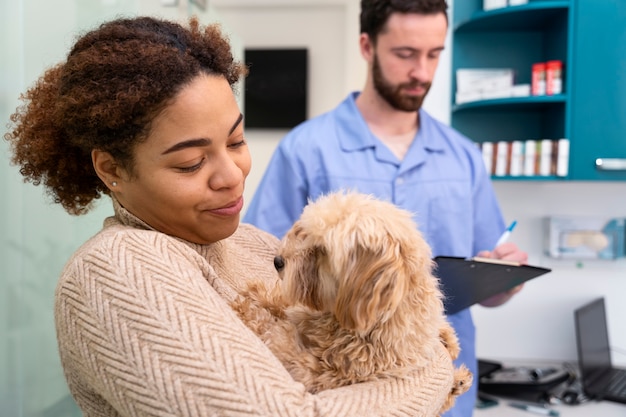How to Identify Signs of Pet Anxiety at Home


How to Identify Signs of Pet Anxiety at Home
Many pet owners in Fishers understand the deep bond they share with their furry companions, so noticing changes in behavior or mood can be concerning. Anxiety is a common issue in both dogs and cats, but the signs of pet anxiety are not always clear. As your trusted neighborhood veterinary team at Pet Vet Animal Hospital, we know how important it is to recognize early signs before anxiety escalates into more serious behavioral or health problems. In this guide, we’ll help you understand the subtle and not-so-subtle signs of pet anxiety, uncover what might be causing these shifts, and share practical tips to support your pet’s emotional well-being. We’ll also explain when it’s best to schedule an appointment with our veterinarians at 14065 Mundy Dr, Fishers, IN 46038 for professional guidance.
Whether you live in Fishers or the surrounding communities, knowing how to interpret behavioral changes in pets helps you be proactive about their health. Early intervention is key, and our team is here to help you every step of the way with comprehensive care programs, including wellness examinations to support your pet’s overall health.
Read on to learn how to spot anxiety in your pet, what you can do at home, and when it’s time to seek help from a “vet near me.”
Recognizing the Signs of Pet Anxiety in Fishers
Understanding when your pet is anxious can sometimes feel like solving a puzzle. The signs of pet anxiety are often subtle at first, but attentive pet owners can catch early warning signals by paying close attention to changes in routine and demeanor. Behavioral changes in pets that may indicate anxiety include becoming more withdrawn, pacing restlessly, or suddenly hiding in unusual places. You might also notice your pet trembling, vocalizing more than usual, or developing destructive habits like chewing furniture or scratching doors.
Physical symptoms of anxiety can present as excessive panting, drooling, or even changes in appetite. Some pets begin to eliminate outside the litter box or have accidents indoors, despite being previously house-trained. Overgrooming, such as constant licking or biting at their fur, is another sign that anxiety may be affecting your pet’s wellbeing. In Fishers, seasonal storms or holiday fireworks often trigger these responses, so keep an eye out for patterns that coincide with local events or weather changes.
Separation anxiety is especially common in dogs and can manifest as frantic behavior when you prepare to leave the house. Cats may become more vocal, refuse to eat, or isolate themselves. Every pet is unique, so understanding your animal’s normal habits is the best way to spot when something feels off. If you’re unsure, our veterinary professionals can assist you in determining if what you’re seeing truly points to anxiety or if another health issue might be present.
Why Do Pets Experience Anxiety? Causes and Contributing Factors
Pet anxiety can develop for a variety of reasons, and understanding the root cause can help you tailor your support. Common triggers for anxiety in pets include changes in the household, such as a recent move, new family members, or even a new pet in the home. Loud noises, including thunderstorms and fireworks, are well-known culprits in Fishers, particularly during summer months.
For many animals, a lack of socialization during their early weeks can increase the likelihood of developing anxiety later in life. Pets with a history of trauma or shelter life, as well as those suffering from chronic pain or illness, are also more prone to anxious behaviors. Allergies or sensitivities—especially in pets with ongoing skin or digestive concerns—can further contribute to restlessness or irritability. If you suspect allergies may be a factor, our allergy assistance services can help address underlying causes and improve both comfort and behavior.
Additionally, some pets have a genetic predisposition to anxiety, particularly certain breeds. Environmental factors, such as being left alone for long periods or not having enough mental stimulation, can also play a significant role. Understanding what might be contributing to your pet’s anxiety is the first step toward positive change, and our team is always available to discuss your concerns in detail.
Professional Treatment and Support for Anxious Pets in Fishers
If your pet shows ongoing signs of anxiety, it’s time to consider a professional evaluation. At Pet Vet Animal Hospital, our veterinarians are trained to identify and address the root causes of anxiety, offering compassionate care tailored to your pet’s needs. Treatment options for pet anxiety in Fishers may involve a combination of behavioral modification, environmental adjustments, and, in some cases, medical support.
During a wellness examination, our veterinary team will review your pet’s medical history, perform a thorough physical exam, and discuss any recent behavioral changes. Diagnostic tests may be recommended if underlying health issues are suspected. For pets with anxiety linked to allergies or nutritional deficiencies, our clinic offers nutritional counseling and allergy assistance to address these aspects holistically.
Behavioral therapy can include desensitization techniques, environmental enrichment, and structured routines to help your pet feel more secure. In some cases, calming aids or prescription medications may be part of the treatment plan, always tailored to your pet’s specific circumstances and only after a thorough evaluation. Our goal is to work closely with you to create a supportive environment where your pet can thrive, whether anxiety is mild or more severe.
Supporting Your Pet’s Mental Health at Home: Prevention and Daily Care
Helping your pet feel safe and confident starts at home. Establishing a consistent routine, with regular feeding and play times, can provide the structure anxious pets need. Creating a designated safe space—such as a quiet room or cozy crate—can give your pet somewhere to retreat when they feel overwhelmed, especially during loud events or when unfamiliar visitors arrive.
Providing plenty of physical exercise and mental stimulation is essential, particularly for dogs who may become restless or destructive when bored. Puzzle toys, interactive games, and daily walks are great ways to keep your pet engaged. For cats, vertical spaces and hideaways can help them feel more secure. Recognizing situations that trigger anxiety, such as storms or separation, allows you to prepare in advance by closing windows, playing soothing music, or using pheromone diffusers.
Diet can also influence your pet’s mood and overall wellbeing. If you’re concerned about your pet’s nutritional balance or want to explore dietary changes that may support mental health, our veterinary team can provide expert advice. Consistent, positive reinforcement during training and gentle handling are key components in reducing anxiety and fostering trust.
If allergies or sensitivities seem to play a role in your pet’s anxiety, addressing these conditions can lead to significant improvements. For more information, our allergy assistance service is available to help you identify triggers and develop an effective management plan.
When to Seek Veterinary Care for Pet Anxiety in Fishers
While mild anxiety can often be managed at home, there are times when professional guidance is essential. If your pet’s anxiety is severe, persistent, or leads to problematic behaviors such as self-injury, loss of appetite, or destruction of property, it’s time to schedule an appointment with our team. Changes that appear suddenly or worsen over time should never be ignored, as they may indicate underlying health problems.
Other red flags include repeated accidents indoors, excessive vocalization, or signs of depression like lethargy and social withdrawal. If your pet’s quality of life is being affected, or if your efforts at home do not bring improvement, our veterinarians can help determine the next best steps. Remember that anxiety can sometimes mask more serious medical conditions, so a comprehensive pet exam is the safest way to address your concerns.
In Fishers and the surrounding communities, compassionate and effective care for anxious pets is only a phone call away. If you are searching for a “veterinarian near me” who understands the importance of mental as well as physical health, our team at Pet Vet Animal Hospital is ready to help.
Take the Next Step for Your Pet’s Wellbeing
Pet anxiety can be distressing for both you and your pet, but with the right support, it is manageable. By staying alert to changes in behavior, providing a stable and loving environment, and seeking guidance when needed, you can help your pet feel more secure and confident. Our veterinary professionals at 14065 Mundy Dr, Fishers, IN 46038 are committed to providing comprehensive care, from behavioral consultations to wellness examinations and tailored nutritional counseling.
If you notice signs of pet anxiety or behavioral changes in pets, don’t hesitate to reach out. Schedule an appointment with our team by calling (317) 792-8919, and let us help your companion find comfort and calm. For those searching for a “vet near me” who prioritizes the mental and physical health of pets, Pet Vet Animal Hospital is your trusted local partner in Fishers.
Together, we can ensure your pet enjoys the happiest, healthiest life possible.
Disclaimer: This blog is intended for informational purposes only and should not be considered a substitute for professional veterinary care. If you have specific concerns about your pet’s health or behavior, please consult our veterinary team or your local veterinarian.



















